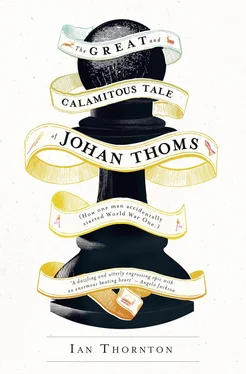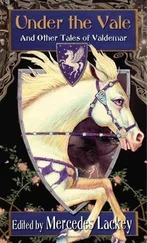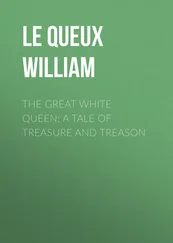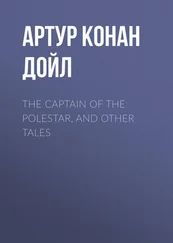And I am the Life.”
He repeated this until his deluded mantra was broken by his own words.
“I have afflicted every soul on this planet. Believers and infidels. Heretics and blasphemers. I defy you to find a life I have not changed or ended. The twentieth century was mine. Just the final Apocalypse to welcome in. Should I have the politeness, should I display the etiquette to die first?”
My grandfather Ernest did nothing all Easter weekend but sit in one of Bosnia’s most dilapidated chairs, in an excuse of a dwelling, with another old man. He did not budge except to urinate and to move his bowels. Uncharacteristically, Ernest hardly said a word himself. He just sat and listened. It was one old gentleman’s story to another; that of the host, a tale which covers a life of over one hundred years; the other not far off, and therefore (as in many biographies and autobiographies) one where a day may seem to last an age and where a decade may slip by within a sentence or paragraph.
According to my grandfather, Johan claimed to have changed—actually to have destroyed—the twentieth century.
Ernest had hoped to keep the story for a time when we would have an adequate number of days together to record the magnum opus of Johan Thoms. There remained within him a discipline to do things correctly and with due process, though this was marvelously mixed with a sense of the romantic and the truly delicious. My grandfather, the ordered musician, the headmaster, the recounter of fine and giant fables. Time, though, would have her wicked way. And so it was my task, my solemn duty, not only to hear the tale of Johan Thoms, but to complete it. Ernest pleaded with me, “Glide gently, my dear boy. In buttercup times. Down country lanes. Never forgetting to fall out from the ranks, look over that old gate, and to smile.”
I should like to bury something precious in every place where I’ve been happy and then, when I’m old and ugly and miserable, I could come back and dig it up and remember.
Evelyn Waugh, Brideshead Revisited
One
Around the Time When Adolf Was a Glint in His First Cousin’s Eye
Give and it shall be given to you. For whatever measure you deal out to others, it will be dealt to you in return.
—Luke 6:38
February 1894. Bosnia
Johan Thoms (pronounced Yo-han Tomes ) was born in Argona, a small town twenty-three miles south of Sarajevo, during the hellish depths of winter 1894.
His family was not overly religious. They were, however, surrounded in the village by enough Catholicism to expose Johan osmotically to the curse of guilt.
Johan was an only child, and had been lucky to live through a worrying labor. He was a breach birth, and arrived a month early, on the twelfth of February. He had jaundice and coughed up blood. The umbilical cord was wrapped tight around his neck. Thick black curls crowned his large head. The cause of his parents’ worry was that another boy had been born to them four years earlier in exactly the same manner. He’d shared the same characteristics: the yellow skin, the breach, the cord, the blood, the hair. Carl had not survived. Drago and Elena feared a repeat. It was probably from this fear that there developed an extra-special bond between parents and child.
Johan pulled through. Within three months, he shed his sub-Saharan curls, and he appeared less yellow by the day. With his now fair hair, the blue eyes of his mother, Elena, and the surname Thoms, there was more than a hint in Johan of Aryanesque lineage from Austria and the north. He became almost normal looking.
Johan was happier than most boys, alone with a soccer ball in the street, or a chess set in front of the hearth. Even if he was only playing against himself—usually the domain of the autistic and potentially schizophrenic—he would remain occupied for hours.
He was a smart child, and he went about his boyhood business with a minimum of fuss. If it had not been for the food disappearing from his plate three times daily, his underclothes getting a weekly scrub, and his bedclothes marginally disturbed each morning, his parents might have sworn that they were nursing nothing more than a friendly poltergeist. He was ordinary and unobtrusive. If he was two, three, or even four hours late home from school, he was not missed. Maybe it would have been better for all involved if his lateness—due usually to his error-riddled sense of direction—had been noted.
Maybe then, things would have been different.
* * *
Johan’s father, Drago, was also an only child, born on his parents’ isolated farm near the Serbian border in 1854. He was forty years old by the time young Johan appeared.
Drago resembled a mad professor (which was convenient given that he was one, albeit a fine one). His unruly hair looked like it was always ready for a street battle, and he lacked full vision in his right eye. He loved to don an eye patch, but equally enjoyed switching the patch from one eye to the other, or even to remove it to see people struggle to know into which pupil to look. His poor vision meant he only did this when stationary, to avoid accidents. This was one of his many ideas of fun. Yet his strong, handsome features outweighed his quirks. He was a strapping six foot three and boasted a lean jaw, olive skin, mocha eyes, and a regulation fashion sense. However, he always donned at least one distinctive, unforgettable item on any given day. This might be a solid silver pocket watch (engraved, chiming, charming), or bright red socks; or, to complement a handlebar mustache, he would loop around his sinewy neck a gold chain with a miniature comb attached. He christened the comb “Jezebel” and would run her through his hirsute top lip.
Drago had flat feet and a tendency to waffle on about absolutely nothing for an age, often to complete strangers. But he had a huge heart. The whole town knew it, as he teased and trundled through his daily life without setting their world on fire.
Chess is a fairy tale of 1001 blunders.
—Savielly Tartakower
May 1901. Near Sarajevo.
Most adults fell in love with Johan’s deep blue eyes, but his contemporaries at school preferred to concentrate on the size of his ash-blond mopped head, which was larger than average at best. At worst, he resembled a fugitive from Easter Island.
Johan walked with that six-year-old’s nongait, which, accentuated by the size of his head and pipe-cleaner legs, verged on a cute stagger.
Of his two passions, soccer and chess, he was far better at chess. With a ball, his will was strong, but not his art. His feet were way too small to keep his head from overstepping his center of gravity, and down he would come. His stock answer whenever some clever clogs informed him that he had fallen over was to slowly get up, dust himself off, and say that he was merely trying to break a bar of chocolate that he had in his back pocket.
On the chessboard, however, he could be nasty. His innocent blue eyes and waifish body masked a killer instinct. In front of the sixty-four squares, he was closer in spirit to Attila the Hun than to Little Lord Fauntleroy.
It must have been the size of that head.
In Johan’s ninth summer, Senad Pestic, the Bosnian grand master and stooping old Arab, came to a school ten miles away from Johan’s, on the southern slopes of Mount Igman, to play against all the best boys in the area. It was an annual event and Johan’s first time. The matches were scheduled for four-thirty, after school and at forty tables set up in a circle in the main hall.
One of Johan’s uncles, Toothless Mico, usually ferried him to chess meets, but tonight Johan wanted only one person to be there: his mother. She would be so proud of her only child, and the little boy always wanted to please her. But she was too busy selling the fruit of (and for) her feudal boss from a makeshift hut in the town square. He comforted himself that if he continued to progress at the game, before long he would be beating grand masters for fun.
Читать дальше











